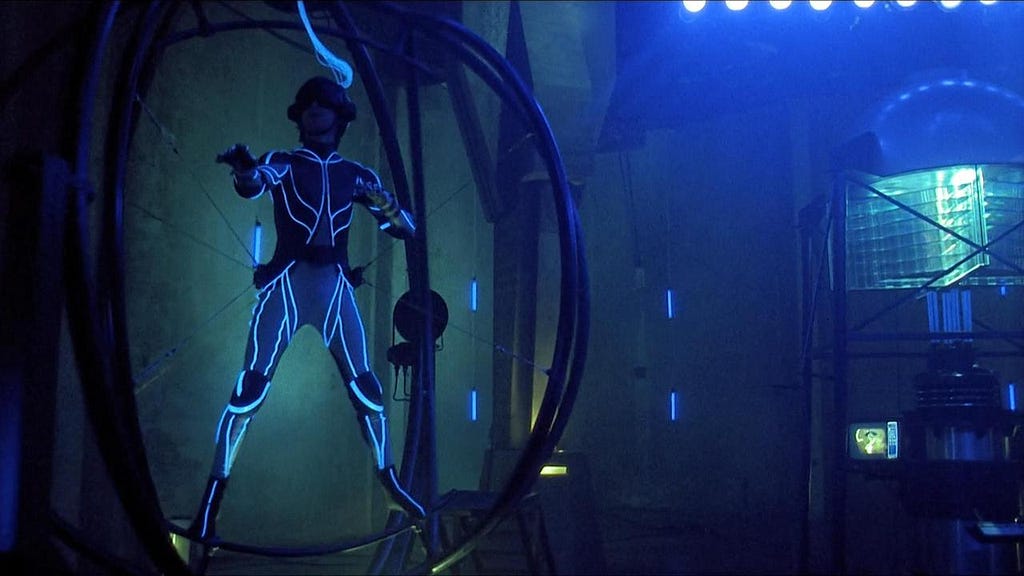
There are films about the future that age well — 2001: A Space Odyssey and Back to the Future Part II spring to mind — and others that seem cheesy and anachronistic in the way they envision our trajectory. Then there are films like 1992’s The Lawnmower Man, which was cheesy and anachronistic the moment it made its way to theaters. The combination of bad special effects and a worse script (as the The Los Angeles Times noted when the film was released, “How can you make a tragedy of intelligence when no one speaks intelligently?”) should have fatally limited the impact of the film. But as a graduate student working on virtual reality (VR) in the early 1990s, it remained a kind of touch point: it was in many ways the unfortunate public face of VR, but also a wonderful popular nod at our postmodern techno-utopia. Almost a quarter of a century later, the film offers a glimpse of what we both hoped and feared VR might bring: godlike power and a loss of our humanity.
Often ignored behind the blocky 3-D game graphics are a number of challenging themes at the collision point of society and technology: man in the state of nature as an ideal, the danger of a technocratic military-research complex, the hubris of scientists hoping to create the perfect human. But at the fore is the question of learning and technology.
Nearly every review of the film notes its parallels to Flowers for Algernon, in which the titular mouse benefits from a rapid increase in intelligence, and its 1968 film adaptation CHAЯLY, in which a character with intellectual deficits has his IQ tripled. In each case, the changes represent a Faustian bargain, and the increase in intelligence comes with a loss, to some degree, of the enhanced character’s humanity.
Superficially, The Lawnmower Man may seem like a movie about VR, but the story has far more to do with the nature of knowledge and how we come to acquire it. As is often the case, the precise method of using a combination of nootropic “smart drugs” and visual stimulation is largely elided. It is difficult, when watching these scenes, not to be reminded of Neo’s rapid learning in The Matrix (“I know kung fu!”), The Fifth Element’s Leeloo coming to terms with all of human history by watching it at high speed on a computer, or any of a dozen other examples of humans, aliens, or robots rapidly assimilating knowledge.
In practice, humans have not had much luck in improving the speed with which we learn. Indeed, claims like the one that Malcolm Gladwell popularized — requiring 10,000 hours of practice to achieve expertise — and suggestions that the demands of our technological world require more hours, years, and summers of schooling, or that the constant use of screens leads to a generation of zombies unable to comprehend complex texts, suggest that we are moving no closer to this kind of “super-learning.” There is even a burgeoning “slow schools” movement.
Nonetheless, elements found in The Lawnmower Man have indeed made their way into practice. Nootropics, then a fairly foreign idea, are now more widely embraced by those wishing to improve their memory or ability to learn. And as in the film, they are frequently being experimented with outside of formal research settings, and often outside of the law. A recent article in The Washington Post detailed the trend of watching television and lectures at slightly higher speeds, and the improvements to attention and retention this garnered. And although it is a slightly more tenuous connection, a recent effort that used VR to train people with spinal cord injuries led to real increases in muscular control. None of these represent the kind of sudden increases in intelligence (let alone psychokinesis!) presented in the film, but these kinds of incremental improvements in the speed of learning do suggest that the use of technology need not make us stoopid. As strange as the idea of using VR to this end seems now, is it any stranger than recent suggestions that transcranial magnetic stimulation might encourage learning?
This may mean that we are temporarily safe from the kind of apocalyptic intelligence, and megalomania, presented in The Lawnmower Man. The theme, however, of intelligence — and particularly technological intelligence — being dangerous runs right through our most deeply rooted mythologies. The tie between intelligence and social class has roots back to Metropolis (1927) and The Time Machine (film 1960, novel 1895), which allow the technological and intellectual elite to live within their idyll only through the labors of a (subterranean) underclass. While the most urgent warning of The Lawnmower Man may be to special effects editors who wish to represent tomorrow’s visual technologies using today’s, just behind it is the question of balancing instrumental intelligence with emotional and social intelligence. In an era when critics of higher education are arguing for fewer philosophers and more engineers (and welders), it may be worth reminding ourselves of how deeply our fears of technologically-mediated intelligence run, and how much the future of our society is built on how we may come to learn.
This piece is part of Science Fiction Frames: a series of incisive analyses, thoughtful meditations, wild theories, close readings, and speculative leaps jumping off from a single frame of a science fiction film or television show. If you would like to contribute to the series or learn more, email us atimagination@asu.edu.
